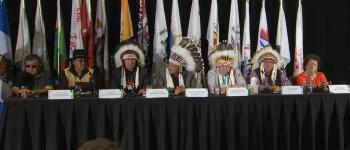Summary
Local Journalism Initiative Reporter
Windspeaker.com
Gordon Burnstick of Alexander First Nation described a conversation between his brother and sister at a family gathering in 2007.
“I love you, sister,”, his brother said, “but I don’t know you.”
The comment made his sister cry remembering the forced estrangement in residential school. Girls and boys were not allowed to speak with each other, not even relatives. Burnstick, his brother, his sister and 16 other siblings are just starting to speak about their experiences. Some still find it hard. Along with his parents, who also attended when they were children, the family’s residential school experience has totaled a little more than 100 years.
Ron Alexis of Alexis Nakota Sioux Nation recalls his late father telling him, “Son, I don’t know how to be a parent. I lost the gift that was given to us by the Creator, because I was all alone in the residential school. Many times I wanted to say I love you. I wanted to give you a hug, but I didn’t know how.”
Chief Randy Ermineskin of Ermineskin Cree Nation said his brother Brian came home from residential school at the age of 16. At the age of 17, he hanged himself.
“He came home, but he didn’t come home,” said Ermineskin. “If he was still here, how would his life have transpired and how great of a person he could have been.”
Chief Desmond Bull of Louis Bull Tribe said Indigenous people living on the streets and battling drug and alcohol addictions are suffering intergenerational trauma.
These harms and so many others are what Pope Francis will be apologizing for when he delivers his principle statement at Maskwacis in Alberta on Monday.
But what that apology will mean will differ among individual survivors.
“Though these harms can never be undone, in order to forget I do believe there has to be forgiveness,” said Treaty 6 Grand Chief George Arcand, Jr.
“If you want to put this pain behind and rebuild as a people, survivors have identified this is a necessary step. Only through forgiveness can we be build new bridges and rebuild our communities,” he said.
Arcand was joined by chiefs from Ermineskin, Alexis Nakota Sioux Nation and Louis Bull Tribe, along with three survivors, to address the media Thursday, only days before the papal visit to Canada.
The Holy Father will begin his six-day stay in Canada with four public appearances in two days in the Edmonton area. From there he will travel to Quebec City for two days. His final stop will be in Iqaluit, from which he will make his return trip to the Vatican on July 29.
Bull said he never expected to experience a visit from the Pope in his lifetime. However, the public outcry, both from Canadians and internationally, when unmarked graves were uncovered at former residential school sites in 2021—at Tk’emlúps te Secwépemc in British Columbia and and weeks later at Cowessess First Nation in Saskatchewan—made the papal response necessary.
“The Pope’s visit may mean something different to each person. It is understandable to say there are mixed emotions…,” said Bull.
Alexis Nakota Sioux Nation Chief Tony Alexis said some survivors see the Pope’s apology as an acknowledgement of the harms inflicted by the church and a necessary step for them to move forward in their healing journey or to find closure.
Others, he said, are angry and still struggling. They don’t want to forgive the church.
And there are Elders and community members who practise their traditional customs and ways and don’t want the church to tell them they are wrong, said Alexis. They want acceptance.
“There’s a real opportunity for leaders of the church and the Indigenous community to come together and build a bridge of reconciliation. True reconciliation is not a photo opportunity. There’s still a great deal of work ahead of us. But it’s a good start. There’s a hope healing will happen, not just for us, but for the church also,” said Alexis.
All chiefs agreed that mental health supports will continue to be needed for survivors long after the Pope has left the community and the country.
There have been commitments made to have large numbers of health workers on the grounds at the papal events.
Arcand said First Nations in Alberta are having ongoing discussions with Health Canada and the Archdiocese in Alberta to continue to build this capacity.
Local Journalism Initiative Reporters are supported by a financial contribution made by the Government of Canada.

